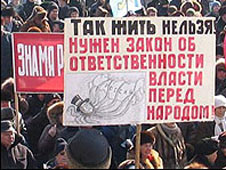
The sign reads: "We can't live like this! We need laws that make the government accountable to the people!"
The BBC reports:
Several thousand people have held a rally in Russia’s Far East, demanding the government resign over the country’s growing economic problems. The protesters in Vladivostok blamed Prime Minister Vladimir Putin’s cabinet for mismanaging the economy and suppressing political dissent. The rally – which passed off peacefully – was the first in a series of protests expected in Russia on Saturday.
Other recent protests across Russia have been broken up by the authorities. Such protests were unthinkable just a few months ago as the economy boomed with record high oil prices and as the Kremlin tightened its grip over almost all aspects of society, the BBC’s Richard Galpin in Moscow says. But now with the economy in deep trouble, there is real fear amongst ordinary people about what the future will hold, he says. He adds that unemployment is rising rapidly, as are the prices of basic food and utilities.
‘Crisis’
The anti-government demonstration in Vladivostok was called by the Communist Party. “The crisis is in the heads of the authorities, not in the economy!” chanted protesters. The protest was joined by a local group angered by higher tariffs imposed on cars imported to the city. The region has thrived on the car import business and the government’s decision has led to job losses, correspondents say.
Several anti-government demonstrators were also held in the capital Moscow and cities. In Moscow, police detained a number of people taking part in an unauthorised protest by the radical National Bolshevik Party. In a separate demonstration in Vladivostock, thousands of supporters of the ruling United Russia held a rally in support of the government.


The interesting questions here are: (a) will these protests become stronger and spread throughout the country? To me, this depends on whether or not the crisis will deepen. If, for some reason, oil prices start going up again after a few weeks, these protests might simply stop; and (b) even if the protests continue and become stronger and more widespread, will they have some effect on the government? Putin seems to be preparing to use as much force as possible to anything resembling a “colored revolution” happening in Russia. Even if a Yeltsin appears to lead the crowd, well, Putin is not a Gorbachëv. I wonder if what will happen isn’t simply: protests + violent repression till protests stop (just like in China’s Tienanmen square).
asehpe, I would be a little cautious about the protests in Vladivostok. Local government (which is as corrupt as the central one) actually supported the protests. So, I see it more as a conflict between the colony and metropolitan power, rather than the genuine anti-governmental protest.
We’ll see. 2009 shapes out to be a pivotal year for Russia.
Felix, got to love the “Peace the old fashioned way” poster on your website!!
I think you are right about the conflict between colony & metropolitan power. However I think that that struggle will ultimately be the death of Russia. Many of the “colonies” in the far east seem to be getting very sick of Russia (Moscow) stealing their resources and giving them jack in return.
Felix, that is indeed true. I hear some protests might also happen in Yekaterinburg, and there are also grievances against the central government in some of the Republics, like Tatarstan or even Mari El. How faithful each local government will be to Moscow is still to be seen. (I’m actually surprised that the Primorsky Krai government sided with the protesters. After all, the government leaders were handpicked by Moscow.)
How much longer can Russia hold on to the far East? We may be seeing a secession.